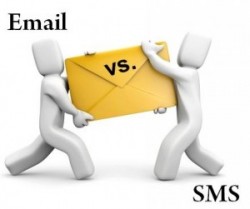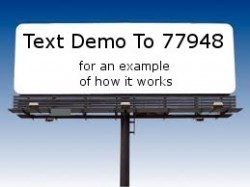SMS marketing has some distinct advantages over email marketing. In this article we compare SMS marketing vs. e-mail marketing. Learn the pros and cons of both SMS marketing and e-mail marketing to see which is the best advertising and marketing for your business.
Technology offers business owners a number of opportunities to market their products and services to customers and potential customers. We are connected in ways that many of us could never have imagined even 15 years ago. For a while, email marketing was the big thing, since it allowed businesses to send messages to a lot of people at one time. However, even though email marketing can be effective, new types of marketing might be even better choices. One of the new trends in marketing is SMS marketing. You might find that this type of marketing provides you with advantages that outweigh email marketing.
Good Points of Email Marketing
There are definitely some good points to email marketing. Email marketing provides you with the ability to reach thousands of people at once. Additionally, if you catch the customer at the right time, you can see an immediate conversion. On top of that email marketing messages are highly customizable. You can also create a situation in which customers receive targeted messages. This can help conversions. Plus, because they are so simple to customize and send, email marketing is rather cost efficient. However, the truth is that many of the advantages associated with email marketing can be found with SMS marketing. And SMS marketing offers some additional advantages that email marketing can’t compete with.
Advantages of SMS Marketing
SMS marketing makes use of the popular cell phone communication method known as the text message. Businesses can send text messages right to the cell phones of customers and potential customers, reaching thousands in an instant. Additionally, it is possible to customize and personalize SMS marketing campaigns in ways that are similar to email marketing. However, SMS marketing has the added advantages of portability and the fact that recipients pay immediate attention to the message.
When it comes to email marketing, many users are beginning to discard messages. They see that the message is from a business, and may decide to discard the message unopened. Another issue with email marketing is that sometimes messages are automatically sent to the junk mail folder. If your message is caught in a spam filter, the intended recipient will never even know that it existed. This can be a real source of frustration for many businesses.
SMS message marketing, on the other hand, doesn’t have those problems yet. The text message is not consigned to a junk folder; the recipient is notified immediately that it has arrived, and many cell phone users will read such text messages. Even if the recipient decides to block you from send SMS marketing messages, it still represents an active step that the potential customer has to take, rather than something that happens automatically, as with email marketing messages sent to the junk folder automatically.
Another advantage that SMS marketing has is that it can provide a impetus for action while the recipient is available to do something. It is possible for businesses to send SMS marketing messages to the cell phones of people in a certain area, offering a special deal if they come in. Recipients are already in the area, so it is much easier for them to act on the message received. The immediacy that comes with SMS marketing can be a real advantage to businesses, and it’s something that may not be available with email marketing.
Bottom Line
Email marketing can have its place. It is a great way for businesses to share newsletters and exclusive deals to those who have opted in to receive communications. However, email marketing has some drawbacks that are difficult to overcome. SMS text marketing, on the other hand, represents opportunities for the future. The nature of SMS marketing encourages immediate action, and it also makes it difficult for recipients to overlook the messages they receive. It is definitely worth it for a business to consider the possibility of SMS marketing as part of an overall strategy.









